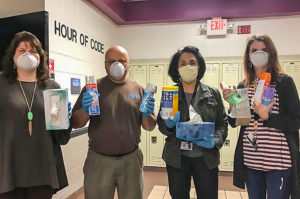 Recent weeks have witnessed an uptick in COVID-19 metrics in North Carolina and across the nation, even showing in the early warning wastewater monitoring system. After a trend of decreasing metrics throughout 2023, the numbers are now rising, affecting various COVID-19 indicators such as hospital admissions and emergency department visits, according to the North Carolina Respiratory Virus Dashboard.
Recent weeks have witnessed an uptick in COVID-19 metrics in North Carolina and across the nation, even showing in the early warning wastewater monitoring system. After a trend of decreasing metrics throughout 2023, the numbers are now rising, affecting various COVID-19 indicators such as hospital admissions and emergency department visits, according to the North Carolina Respiratory Virus Dashboard.
“We expect COVID-19 trends to rise and fall. While the public health emergency in response to COVID-19 has ended, COVID-19 is still with us and we expect it to continue to be with us,” said State Health Director Dr. Elizabeth Cuervo Tilson in a press release. “Some people, including older people, people with underlying health conditions or compromised immune systems are at higher risk for severe illness with COVID-19. Fortunately, we have the tools for people to protect themselves and each other, including access to vaccines, testing and treatment to help manage COVID-19 and other respiratory diseases.”
Two other seasonal viruses, influenza and respiratory syncytial virus (RSV), also cause respiratory infections and can result in severe illness or death. These infections typically peak between December and February, but the timing has become more unpredictable since the onset of the COVID-19 pandemic. Last fall saw widespread infections of COVID-19, flu, and RSV simultaneously, putting considerable strain on healthcare and hospital capacity.
The NCDHHS underscores the importance of vaccines as the best protection against COVID-19, flu, and, now for the first time, an RSV vaccine for those 60 years and older. Additionally, a new medication is available to prevent RSV infection in infants.
For the upcoming fall respiratory virus season, North Carolinians are urged to take the following precautions:
- Stay Current with Vaccinations:
- Receive up-to-date with COVID-19 vaccines and the expected updated booster available by the end of September.
- Get the annual flu vaccine, preferably in September or early October, especially for those at higher risk.
- Individuals 60 years and older should consult with their physicians about receiving the RSV vaccine.
- Prepare for Testing and Treatment:
- Have COVID-19 tests on hand and a treatment plan.
- Visit the Testing & Treatment | NC COVID-19 (ncdhhs.gov) site for information on free COVID-19 tests and accessing treatment.
- Contact healthcare providers if symptoms of COVID-19 or flu are present, especially if in higher-risk groups.
- Take Additional Health Measures:
- Implement basic protective measures like regular handwashing, covering nose and mouth when sneezing, cleaning surfaces, and staying home if unwell.
- Consider extra protection like wearing masks in higher-risk settings or if at high risk.
- Parents should consult with their child’s doctor regarding the new medication to prevent RSV infection.
- Monitor the North Carolina Respiratory Virus Summary Dashboard for the latest information on respiratory virus activity, including COVID-19, influenza, and RSV.
These steps, highlighted by NCDHHS, aim to keep residents safe and well-prepared as the virus continues to be a health concern in North Carolina.


